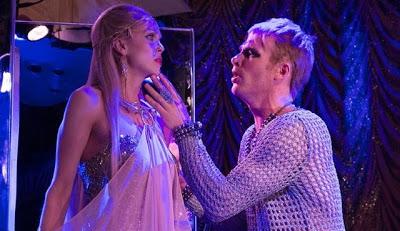by Paul J. Pelkonen

Decadence dance: Micaëla Oeste and Christopher Ainsle in a scene from Eliogabalo at The Box.
Photo by Richard Termine © 2013 Gotham Chamber Opera.
Cavalli’s opera (which was withdrawn from the Venetian stage shortly after its premiere) is a highly sanitized, even prim account of the four-year reign of the Roman emperor Heliogabalus. The opera presents the teenaged emperor as a cross-dressing sexual predator determined to ravish every woman if he cast, Renaissance sexual mores caused the librettists to eliminate mention of the real Heliogabalus’ self-prostitution in the royal palace, his determination to set himself up as the high priest of his own religion, and his notorious and lengthy relationship with his favorite charioteer.
At heart, Eliogabalo is a conventional confrontation between the forces of the Emperor (all represented in this production as transvestites and fetishists) and the scheming (but marginally less kinky) Romans out to whack said tyrant before he rapes or kills them. The opera was presented here in a trimmed two-and-a-half hour edition that kept the action moving across the narrow silver “fashion” runway that served as the primary acting surface.
The physical constraints of performing in The Box did not seem to bother countertenor Christopher Ainsle. He played the despot with a rock-star sensibility that owed something to Transformer-era Lou Reed, veering between florid vocal display and a crooning tone that repelled and seduced at the same time. His costumes were more outrageous as the evening went on, but Mr. Ainsle managed to make the vocal flourishes outshine even his glittering Mylar-fringed cape.
Part of the problem with having such a figure at the center of an opera is that all the characters surrounding him fade in the light of his debauchery. Soprano Micaëla Oeste brought a sweet, not-so-innocent tone to Flavia, the most prominent among the Emperor’s many sexual obsessions. As Alessandro, the young military idealist who eventually succeeds to the throne, mezzo Emily Grace Righter sang with a pleasing, heroic tone, making the tiny theater resound. Countertenor Randall Scotto was a strong second lead as Giuliano, Flavia’s revenge-minded brother.
To carry out his plans (which included repopulating the Roman Senate with prostitutes and staging a banquet for Alessandro with both drugged and poisoned wine) Eliogabalo is aided by minions. As Lenia, cross-dressing character tenor John Easterlin gave a performance of dramatic range and power, camping it up like Nathan Lane in The Birdcage. Daryl Freedman was also cross-dressed, with a studded eyepatch, a riding crop and a natty gray suit that belied her powerful mezzo-soprano. Finally, burly baritone Brandon Cedel made the ,o ut of his comic turns as Nerbulone, the whip-cracking overseer who is just a party guy at heart.
Grant Herreid led the small onstage orchestra from the theobromine, occasionally switching to Venetian guitar to accompany the singers. Clever direction by James Marvel and a young cast full of athletic, bold singers surmounted the problems of the limited acting surfaces. A formidable quartet of exotic dancers and a lone aerialist contributes to the snow’s carnival atmosphere, making the massive technical problem inherent to staging a 17th century opera in a burlesque house invisible to the average theater-goer.

